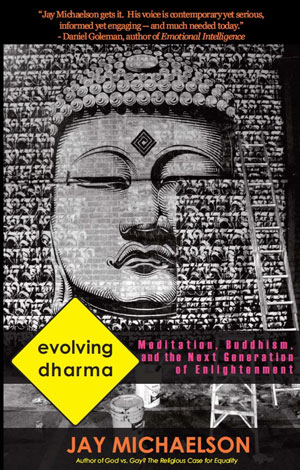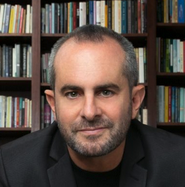
Evolving Dharma: Meditation, Buddhism, and the Next Generation of Enlightenment
Evolving Dharma is a “next generation” dharma book, published by North Atlantic Books in 2013. It tells the story of how American Buddhism evolved into its present forms, and where it might be headed next. It also describes the evolution of one’s personal contemplative path, based on Michaelson’s own years of meditation, including multiple long silent retreats, and his “progress” along various Buddhist paths to awakening. And it discusses how meditation may be integrated into a contemporary life and contemporary politics and philosophy.
Fearless, unorthodox, and irreverent, Michaelson introduces the reader to maverick brainhackers, postmodern Buddhist monks, and cutting-edge neuroscientist, featuring interviews with Richard Davidson, Jon Kabat-Zinn, Lama Surya Das, Stephen Batchelor, and other leading figures, it is the authoritative guide to the mindfulness revolution.
Praise for Evolving Dharma
“Jay Michaelson gets it. His voice is contemporary yet serious,informed yet engaging — and much needed today.”~ Daniel Goleman, Author of Emotional Intelligence
“I highly recommend this book. Its scholarship on the past is solid, its review of the present is revealing, and its sense of possibility grounded in both kindness and vision.” ~ Daniel Ingram, author of Mastering the Core Teachings of the Buddha
“Taking the reader from the banks of the Ganges to the offices of Google, Evolving Dharma shows how meditation is transforming our world. A must-read!” Deepak Chopra
“What a fantastic book! Smart, tender, incisive, and visionary. If you only read one dharma book this year, read Evolving Dharma.”~ Kenneth Folk, teacher, Kenneth Folk Dharma and Buddhist Geeks
“Evolving Dharma tells a story that is changing the world: the mainstreaming of meditation and the democratization of wisdom. This is not only the best book on contemporary mindfulness; it is the first of its kind.” ~ Josh Baran, former Zen monk and author of The Tao of Now
“All of us need to Occupy the Dharma, to take meditation and mindfulness back from the spiritual 1% and enliven our lives. This book demonstrates and instructs us how to do exactly that. Evolving Dharma is essential reading.” ~Â Lama Surya Das, author of Awakening the Buddha Within
Reviews of Evolving Dharma
Read Publishers Weekly’s rave review of Evolving Dharma.
Read the Velveteen Rabbi’s insightful analysis of Evolving Dharma.
Watch Buddhist Geeks’ interview with Jay about Evolving Dharma.
Read Terry Patten’s account of his conversation with Jay and his views on Evolving Dharma.
Q&A with Jay in Examiner
Watch Jay discuss four ways of embracing life’s ‘shit,” via Tricycle.
Q&A with Author Jay Michaelson
What inspired you to write Evolving Dharma?
This is really the book I wanted to write right now. I wanted to tell the story of a phenomenon that is rapidly changing the Western world—the mass adoption of meditation—but I also wanted to tell it from a personal point of view, about my own winding road in practice and how it’s impacted my life.
It’s corny but I really do think that contemplative practice may change the world. I don’t know of a better way to help us become better animals than we might otherwise be.
What’s the most important take-home message for readers?
Meditation is not religion, not spirituality—it’s a technology of upgrading the mind that can enrich one’s life, including one’s religious life. We’re used to the idea of physical fitness. Time to get used to the idea of contemplative fitness, and practice at least as diligently.
How did you get started on the path of Buddhism?
In college and later in graduate school, I studied mystical texts and was entranced by the possibility of profound mystical experiences. Yet I never tried to have them for myself — not until later in life. I came to meditation for experiences of transcendence, only later to find out that they weren’t what really matters.
Is there anything you had to leave out?
I excerpted pieces of my own retreat journals in the book, and had more in there originally. Honestly, though, it was too corny and too mistaken to leave in. Most beginning practitioners go down a lot of blind alleys, filled with mistaken notions about the purpose of practice, the signs it’s going well, and what to do next. At least I know I did. So I cut out a few of the more embarrassing bits. And left others in.
What are some of the biggest misconceptions about your topic?
For meditation “outsiders,” it’s that you need to be a hippie to meditate.
For meditation “insiders,” it’s that you’re not supposed to make progress in practice. I understand why this idea was once useful, and it’s true that meditation is not really about getting anywhere or accomplishing anything. But, and this is an important but, it is possible to get better at not getting anywhere.
All the Asian contemplative traditions have notions of a path, of development, of a dharma that evolves over the course of one’s practice. Yet in many streams of Western Buddhism, this idea was not just lost but deliberately omitted in translation.
Did you have a specific audience in mind when writing?
The truth is, there are a lot of Buddhist books out there. Rather than go for mass market on this one, I wanted to write the book I wanted to write, for my circle of serious-practitioner friends, intelligent skeptics, and pragmatic contemplatives—all of whom are either Gen-X or millennial, and none of whom have any patience for either of those sets of cliches.
What is the “next generation of enlightenment”?
The very notion of liberation, or enlightenment, is evolving. We understand what it looks like in neuroscientific terms, and we’re in a more mature position to appreciate it experientially. Liberation involves building up your pre-frontal cortex so that it can mediate between even the most intense impulses from other parts of your brain. This shifts how we understand meditation itself — what it’s doing, what it’s about.
Are you hoping to inform readers? Entertain them? Piss them off?
I’d love for a smart, cynical reader to say “hmm, I guess meditation isn’t just hippie indulgence after all,” and for that reader to consider doing something that makes the world a better place—starting with their mind.
I also hope that people who have been doing some meditation already read the personal, developmental chapters and decide to go for some more hardcore practice themselves.
Is there a book out there you wish you had written? Which one? Why?
One of the models for this book is Jack Kornfield’s After the Ecstasy, the Laundry, which is one of the few books to take the developmental path seriously, and which also has an awesome title that is itself a powerful lesson on the dharma.
I also have been rereading Pema Chodron’s When Things Fall Apart which is radical and wise, with not a bromide in sight. People think of Ani Pema as sweet and cuddly, but that book kicks your butt.















